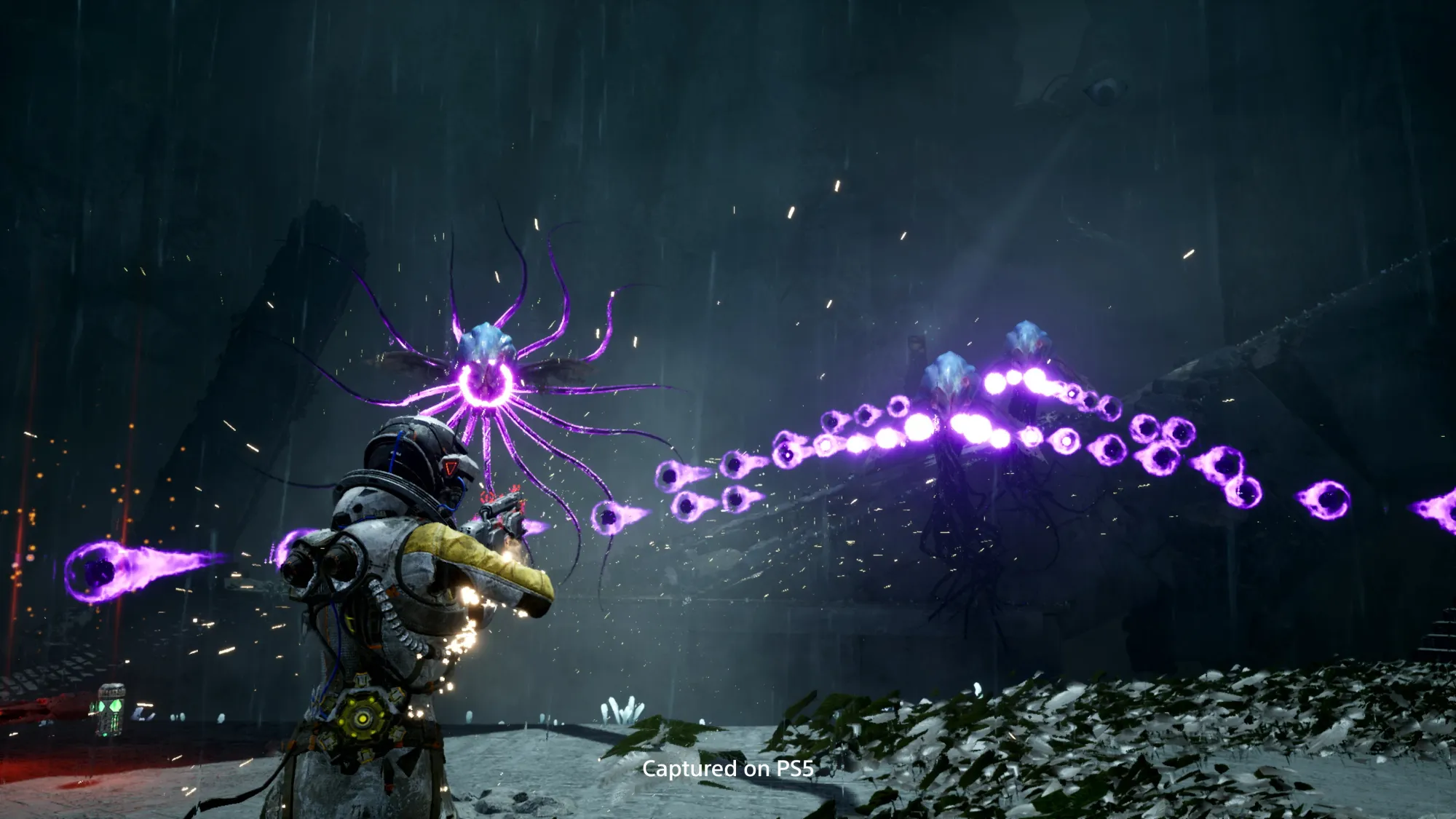Returnal Can’t Handle the Risks of Roguelite Design
Weighing up the risk and reward approach

Returnal was a game I was very eager to play given the chance — a third-person roguelite shooter from Housemarque who have made a name for themselves with high action and arcade design. Returnal is their biggest reach yet in terms of elevating their design, but while this game shoots for the stars, it doesn’t quite get there.
Rocket Woman
We play as Seline, an astronaut who crash lands on a mysterious world following the signal of the “white shadow.” Upon arriving, she realizes that she has been here many times before and is caught in a time loop. Now she must fight her delusions, myriad enemies, and hopefully get off the planet and figure out what is going on.
You can see Housemarque’s expertise in bullet patterns and over-the-top action in full display in Returnal. Enemies attack in melee, but most of them will shoot enough colored balls and blasts to fill a laser light show or a rave. Your main defense is being able to dash in a way that also grants i-frames as you try and deal with them as fast as you can.
The main aspect of Returnal, much like arcade design, is rewarding mastery above all else.
Adrenaline Rushing
At its heart, Returnal wants the player to demolish all the enemies that stand in their way, and to do that, you’re going to need to get good. There are very few gameplay-effecting permanent unlocks in the game —such as getting more space for consumables, and the appearance of new artifacts and weapons. If you’re hoping to unlock more base health, more starting damage, etc., this is not that game. You will unlock new abilities to move around the environment after beating select bosses, and this serves to give you alternate areas to explore, skip certain sections, or access more reward rooms.
As you fight enemies, you’ll build up adrenaline that will unlock different passive abilities at certain levels — including easier reloads, the ability to see enemies from behind walls, better resource collections, and more. However, any damage will reset this back to 0 and playing with full vs. no adrenaline is a big deal.
When you die, you will start back at the beginning of the act that you’re in, but unlocking major upgrades will allow you to speed through or avoid certain areas, and bosses stay dead when they are defeated.
All this sounds great so far, but Returnal’s biggest issue is that it can’t quite get the roguelite elements to work with the high-skill requirements of the game.

All this sounds great so far, but Returnal’s biggest issue is that it can’t quite get the roguelite elements to work with the high-skill requirements of the game.
Risky Returnal
Returnal wants to be a game about risk/reward, but it puts too much emphasis on the risk side of the equation. As you play through, you’ll find treasure chests and items that can corrupt you for opening them. When Seline is corrupted, she gains a malfunction that acts as a debuff. This can be as small as taking increased damage, to severely affecting the run. To remove a malfunction, you must perform a specific condition that is randomly chosen, and you can stack malfunctions over the course of playing.
Here’s the problem: the fundamentally high skill requirement to play Returnal means that adding further difficulty and risk for the player isn't worthwhile. This is because most of these choices don’t even tell the player what the positive outcome is; it’s too risky to upset your run for an item or resources that may not even matter to you. The one exception is the parasites that do tell you the pros and cons of equipping them.
The difficulty of the game is on the higher side, and many rooms of enemies can be more dangerous to fight than the area boss itself. Elite variants can create additional bullet patterns, mess with the environment, and you can go from full health to dead very quickly. Given that danger, it doesn’t make sense to put any additional constraints on your run for a short-term reward. Contrast this with any other roguelite or roguelike, and the player always has an idea of what an item does, and there are enough different items to make the runs feel varied.
Run length is also a factor here, as each biome can take a good 40 minutes to an hour to explore thoroughly, and the only permanent progress comes in the form of completing a major objective. You can earn extra lives by spending the game’s persistent currency–ether–at specific spots, but that also means finding them in the first place.
The problem that Returnal has is that it misses the target of roguelite design. The whole point is that through persistence and unlocks, everyone should be able to get through a game. Here, the player is not unlocking enough content or upgrades to supplement their ability to play. If you’re really good at the game, then you will be able to get through it regardless of what items or artifacts drop during a run. If you’re not good at the game, then there’s not going to be enough elements to make a run different enough to give you a sporting chance.
Upon finishing the game, there are requirements to get the true ending, but doing another complete run of it just did not interest me in the slightest, and a roguelite that isn’t interesting to replay is unfortunately not a good one.
Live, Die, Repeat
Returnal is not a bad game, and the third-person shooting with bullet hell dodging is fantastic. But the roguelite concept simply doesn’t mesh with the core gameplay on offer here. People who are good at the game won't worry about persistent upgrades and restarting. People who aren't will find there aren’t enough tools and elements to help them cross the finish line. This is a game where you should come for the story and the shooting, but not for the returning.
If you enjoyed this story, consider joining the Game-Wisdom Discord channel. It’s open to everyone.
